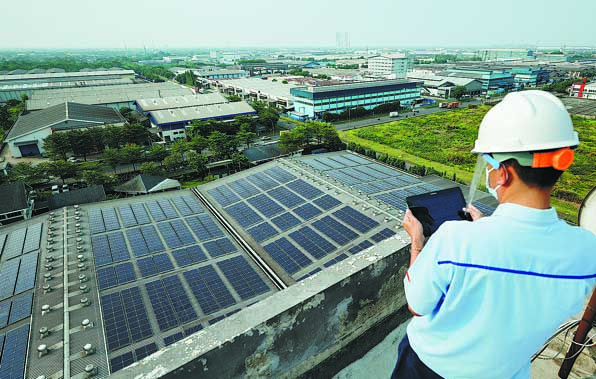Indonesia's move to gradually reduce dependence on coal and promote renewable energy will serve as a model for other countries wanting to pursue climate-friendly growth, analysts said.
Indonesian President Joko Widodo issued a decree on Sept 14 instructing government agencies to prepare a road map for renewable energy development and the gradual phasing out of coal-fired power plants.
The Presidential Regulation No 112 of 2022 on the Acceleration of Renewable Energy Development for Electricity Generation, or PR 112/2022, is in line with Indonesia's commitment to hit net zero emissions by 2060.
It comes as Indonesia holds the presidency of G20, and Indonesia has listed sustainable energy transition among its priorities as this year's G20 head.
 An engineer checks the electrical power from the solar panels installed on the roof of a flour mill in Indonesia's West Java Province on Sept 15. WILLY KURNIAWAN/REUTERS
An engineer checks the electrical power from the solar panels installed on the roof of a flour mill in Indonesia's West Java Province on Sept 15. WILLY KURNIAWAN/REUTERS
Putra Adhiguna, energy analyst at think tank Institute for Energy Economics and Financial Analysis, said that by issuing PR 112/2022, Indonesia sets an example that it is committed to developing renewable energy and phasing out coal-fired plants, even though it is highly dependent on coal for its energy needs and export revenues. The Southeast Asian nation is the world's biggest coal exporter.
Coal-fired power plants release large amounts of carbon emissions and are a key contributor to climate change.
Fabby Tumiwa, executive director of the Institute for Essential Services Reform in Jakarta, said PR 112/2022"will show Indonesia's leadership in addressing (the) climate challenge".
Tumiwa said the electricity sector accounts for around 40 percent of Indonesia's total emissions and can be considered "low hanging fruit" in Indonesia's path toward decarbonization.
He said this regulation is the first step toward Indonesia's goal of eliminating coal-fired plants, and added that reducing coal-based electricity is "a huge undertaking" for the country.
Coal accounts for roughly 60 percent of electricity generation in Indonesia. Renewable energy accounted for 12.2 percent of total electricity generation between 2015 and 2019.
Demand boosted
Rapid economic growth has boosted energy demand in Indonesia, pushing it to rely on coal — an abundant indigenous resource. However, total energy sector emissions have grown faster than energy demand, according to the International Energy Agency.
The IEA said emissions from Indonesia's energy sector were around 600 million metric tons of carbon dioxide last year. This made Indonesia the world's ninth-largest emitter. Its per capita energy CO2 emissions are only 2 tons, or just half the global average.
But Indonesia is a signatory to the Paris climate pact and has committed to reducing emissions.
PR 112/2022 is in line with this commitment. It has set the procurement and electricity purchase price mechanisms for renewable power plant projects. This is meant to encourage investment in geothermal, hydropower and solar power.
Isabella Suarez, an analyst at the Centre for Research on Energy and Clean Air, said Indonesia has yet to tap the full potential of its renewable energy sources and that is why it is important to provide incentives to investors.
Leonardus Jegho in Jakarta contributed to this story.













